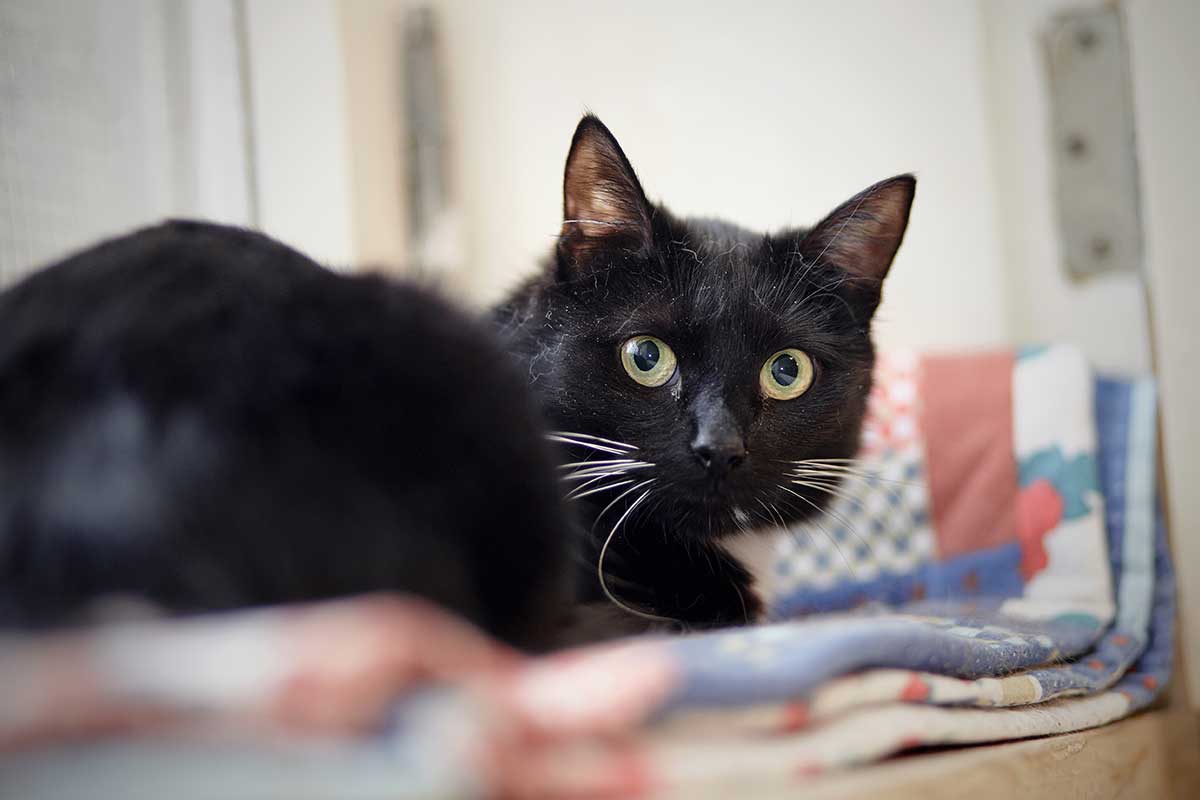Does your cat streak for the bedroom and dash underneath the bed every time she hears the doorbell ring? Do visitors seem disbelieving that you actually have a cat because they’ve never seen her? I know just how you feel. That was the case with my cat Shelby, a beautiful but painfully shy black-and-white domestic longhair.
Shelby’s fear of strangers isn’t uncommon. While cats are considered predators because of their teeth and claws, their small size also places them in the prey category. It’s instinctive for them to react fearfully to anyone or anything that’s new in their territory and doesn’t have that familiar scent of family or friend.
In fact, the tendency to fear strangers is embedded in a cat’s genes. Research shows that friendly males produce friendly kittens, even if they don’t spend time with them during their formative weeks. The father’s genes have a powerful influence on kitten sociability even though the mother spends more time with them. (Kittens from a friendly father are also braver about approaching unfamiliar objects.)
Socialization can help to decrease fear of humans, but only if it occurs between the ages of two and seven weeks, the primary period when kittens are open to new experiences. Continued handling through the 14th week can help, but that early exposure to humans is most important in determining how a cat will react to people throughout the rest of her life.
Cats without that gene for boldness have a difficult time overcoming their reluctance to encounter strangers. Because they’re usually under the bed, it’s not easy to gradually expose them to the new person or to have the new person toss them treats or give them meals.
The solution is not to drag the cat out from under the bed and insist that she meet your friends or neighbors. That’s a recipe for disaster!
Your best option is to give the cat a “safe room” that contains all of her needs: food, water, litter box, and toys. Leave the door partially open so she can choose to come out if she wants. Establish a regular schedule for meals, scooping the litter box, and playtime so that she comes to know when someone will be entering the room and providing care. A diffuser that sends out comforting feline pheromones or toys stuffed with organic catnip may also help her to relax.
If the stranger is someone who will be spending a lot of time in the home (a new spouse, for instance), access to a safe room and the routine allow the cat to gradually become accustomed to the person’s scent and sound. Eventually the new person can begin offering the cat treats, tossing them in her direction without looking at her instead of giving them directly. Play with a favorite toy or feeding meals are other ways to win the cat’s favor. Stick to the schedule so your cat isn’t startled by an unexpected intrusion.
My friend Sue-Ellen’s cat, Scout, was also fearful of guests. Sue-Ellen’s husband Richard belonged to a group of hammered-dulcimer players who met at the house weekly to practice. For a while, Scout opted to stay hidden, but eventually she became used to their presence—probably aided by the regular schedule—and even became friendly with them.
For cats who are simply afraid of the occasional guest, it’s best to give them access to their safe room and not force company on them. That’s especially true for cats with medical conditions such as diabetes, pancreatitis, or lower urinary tract disease, which may be affected by fear, anxiety, or stress. If you have frequent visitors or you are concerned that your cat’s fear of strangers is affecting her welfare, find out if your veterinarian has treatment recommendations or who your veterinarian recommends for addressing cat behavior. There are veterinarians specially trained in treating animal behavior including fear of people (www.dacvb.org). If your cat’s fear of strangers is a new behavior, take her to the veterinarian for a complete health check. She may have an underlying medical problem that’s contributing to her actions. If she gets a clean bill of health, your friends will just have to be satisfied with photos of your feline!
This article was reviewed/edited by board-certified veterinary behaviorist Dr. Kenneth Martin and/or veterinary technician specialist in behavior Debbie Martin, LVT.








